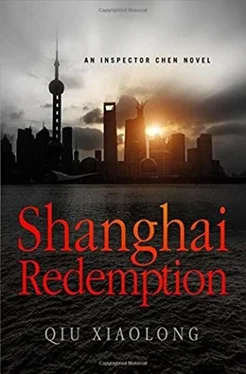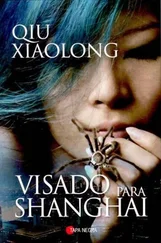To Detective Yu, Chen was not just a partner or a boss but also a friend. What was more, Chen represented what Yu believed a cop should be. For that reason in particular, Yu was deeply disturbed by Chen’s removal.
It was puzzling that, at this juncture, Chen chose to keep himself busy with the renovation of his father’s grave, alone in Suzhou. Though it wasn’t the first time that the ex-chief inspector had behaved in such an enigmatic way.
Chen had made no attempt to discuss the dire situation with Yu. Instead, Chen had contacted Old Hunter. Chen’s reasoning wasn’t difficult to figure out: as a retired cop, Old Hunter wasn’t under scrutiny.
“A penny for your thoughts,” Peiqin said, slicing the thousand-year egg with a thread for a cold dish. Another cold dish-tofu mixed with sesame oil and green onion-would be prepared once the guest arrived. “Thinking about the trouble your boss is in?”
Yu was indeed thinking about just that, though he had no clue what kind of trouble Chen had landed in.
“He’s my friend,” he said.
“Our friend,” Peiqin said echoing. “And Old Hunter’s too. But your father said very little on the phone.”
“He’ll tell us more this evening.”
“What will happen to Chen, no one knows. Still, it might not be bad for him to start all over. He’s not happy. As a Party-member chief inspector, he’s a product of the system. He tries to make a difference but is that even possible?”
***
When Old Hunter finally appeared, the table was set with dainty cold dishes and tiny porcelain cups. Yu poured a cup of tea for him. Peiqin hurried to the stove, lifting the wok lid, adding a handful of chopped green onion and then drops of sesame oil to the slightly browned chicken.
“The three-cup chicken smells irresistible,” Old Hunter said as Peiqin opened a bottle of yellow rice wine.
Raising his cup, Yu lost no time asking questions of Old Hunter. For once, the retired cop answered in a straightforward way. Without dwelling on his meeting with Chen, he launched into a detailed account of his meeting with Tang.
“That’s about all Tang could tell me,” Old Hunter concluded, “but he may be able to find out more soon.”
“Tang has no idea that you’re making inquiries for Chen’s sake?”
“No, I don’t think so. He doesn’t even know that the target at the club was Chen.”
“But he knows that Yu is a friend of Chen?” Peiqin cut in, pouring more wine for Old Hunter.
There was no answer to that. Old Hunter stared at a slice of the thousand-year egg, which was shining darkly, like a mystery covered in minced golden ginger.
Their conversation shifted to Chen’s stay in Suzhou.
Old Hunter unfolded a white rice-paper fan with a dramatic flourish, as if ready for a lengthy digression in a Suzhou opera.
“You know Chen’s in trouble. But you don’t know why he’s in Suzhou, do you?” he said, folding and then unfolding the fan. “Indeed, there’s a lot you can learn from Suzhou opera.”
Yu and Peiqin merely nodded, lest they interrupt the old man’s narrative flow. Old Hunter took a leisurely sip from his half-empty cup, without immediately continuing.
“Why do you say that?” Peiqin asked, refilling the cup.
“I’ve been listening to the Romance of the Three Kingdoms over the last several months. Now that all of the Suzhou opera houses have been torn down, the artists can only perform in restaurants, like in the old days, before there were performance halls. There is a restaurant I go to every Tuesday morning where I can watch Suzhou opera performed over a bowl of plain noodles.”
Peiqin and Yu looked at each other again. Old Hunter was back to his old self, tantalizing them before coming to a crucial point.
“In Romance of the Three Kingdoms , General Liu Bei is with Prime Minister Cao Cao in the capital. Cao Cao, wary of Liu as a potential rival, is thinking of getting rid of him. So Liu makes a public show of being interested in growing vegetables in his garden like an ordinary man, and a timid one at that. At a sudden clap of thunder, he drops his wine cup to the ground in the presence of Cao Cao. As a result, Cao Cao no longer takes Liu seriously, who then manages to flee from the capital.”
“You think Chen is trying to do the same thing,” Peiqin chipped in. “He’s making a public show of weakness by pretending that he cares about nothing but the project with his father’s grave in Suzhou. But do you think it’ll work and his enemies will let him go?”
Neither the father nor the son had an answer to that.
Peiqin walked back over to the stove to prepare the green onion cake while Old Hunter started to ask questions of Yu.
“So, are there any new special cases passed on to your squad?”
“Theoretically, only special cases are referred to our squad, but as far as I can see, none of them are special enough to have Chen removed.”
“Well, tell me about those cases assigned to Chen just before he was removed from the bureau.”
Apparently, Old Hunter was thinking along the same lines as the rest of them, Yu observed, helping himself to a spoonful of refreshingly cold tofu.
“By the way,” Old Hunter went on before Yu said anything, “Chen mentioned that he has electronic copies of the case files for Shang’s son and the dead pigs on the river.”
That meant Chen himself would look into those two cases and Yu needed to focus on the remaining ones. He then briefed Old Hunter on the other cases, particularly on a missing person case concerning an official named Liang, which had been assigned to the squad just the day before Chen was removed. Yu wasn’t sure Chen knew it was a missing person case-he didn’t know if Chen had even opened the file.
“The yellow rice wine tastes quite mellow,” Old Hunter said slowly, at the end of Yu’s briefing. Peiqin came back, her hands still partially covered in flour. “But it’ll be better when warmed just a little. As the old saying goes, after three cups of wine-and the three-cup chicken, too-it’s the time to come to the point.”
“Sorry, I forgot,” Peiqin said, hurrying to put another bottle in a pot of warm water.
“I just got a phone call from Chen. Guess what he wanted me to do this time? He wanted me to check out an ernai here in Shanghai. Ironically, it’s the sort of job we’re quite familiar with at the agency.”
“Why did he want you to do that?”
“I have no clue. I know only that it was a request from a young woman he met in Suzhou. He emphasized that I don’t have to go out of my way. Perhaps it’s unrelated to his current troubles, but I doubt that.”
“If that’s the case, I’m even more worried. It sounds like a shot in the dark, which means he might be desperate,” Yu said. “Did he tell you anything specific about the ernai?”
“She’s a young woman named Jin, who runs a café-a so-called ernai café-in the Gubei area. I wonder if Jin is somehow connected to the nightclub. I don’t think Chen would have asked me to do a job for someone he’d just met at random in Suzhou.”
“Even if it’s for someone pretty…?” Peiqin wondered aloud. “No, not at this particular moment, not even for that impossible romantic.”
“No more interruptions, Peiqin,” Old Hunter said, after clearing his throat. “Now, a tale has to be told from the beginning. It’s about ernai. The new term originated at the time of China’s reform, but it evolved out of the old concubine tradition. Confucius says, ‘If the name is not properly defined, the story won’t come out right.’
“For more than two thousand years, concubines were legal and their social status acknowledged. In the Book of Songs , the first poem is said to be about the queen urging her lord to take a concubine. After 1949, however, monogamy became the new standard under Mao, despite there being no secret about how many women Mao had for himself in the Forbidden City. They served him under different job titles-personal secretary, nurse, dancing partner, special train attendant, and whatnot-but everyone knew what they actually did.
Читать дальше












